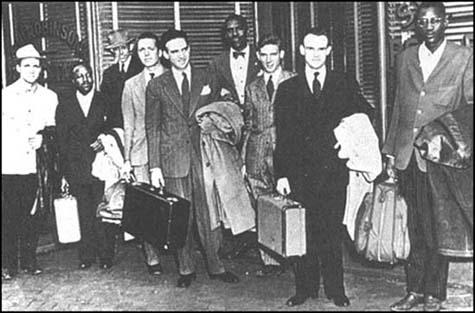YOUR CART
- No products in the cart.
Subtotal:
$0.00
BEST SELLING PRODUCTS

In the wake of the 1946 Irene Morgan ruling, the Congress of Racial Equality, or CORE, founded by FOR staff members James Farmer, George Houser, and Bernice Fisher, sponsored the Journey of Reconciliation, the first Freedom Ride against southern segregation.
By 1947, Rustin was treasurer of the CORE and co-secretary of race relations for FOR-USA. Despite court rulings chipping away at Jim Crow, they felt an on-the-ground campaign was needed to assert the right to desegregated travel. To make the Morgan decision a reality, the two groups organized the Journey of Reconciliation.
Journey of Reconciliation, or “First Freedom Ride,” challenged state segregation laws on interstate buses in the South through nonviolent direct action. Bayard Rustin and 18 other men and women were the early organizers of the two-week journey on April 9, 1947. Participants began their journey in Washington DC, traveled as far south as North Carolina, and returned to DC. The journey inspired the Freedom Rides in the 1960s and early 1970s of the Civil Rights Movement.
The riders suffered several arrests, notably in North Carolina. The NAACP and Thurgood Marshall regarded direct action with skepticism, who feared much violence and little progress toward civil rights. There was limited legal assistance from the NAACP available to those arrested. Bayard Rustin believed that the Journey of Reconciliation and other actions challenging segregation during this time influenced the eventual ruling of the US Supreme Court in 1954 in Brown v. Board of Education. In its decision, the Supreme Court declared segregated schools to be unconstitutional.